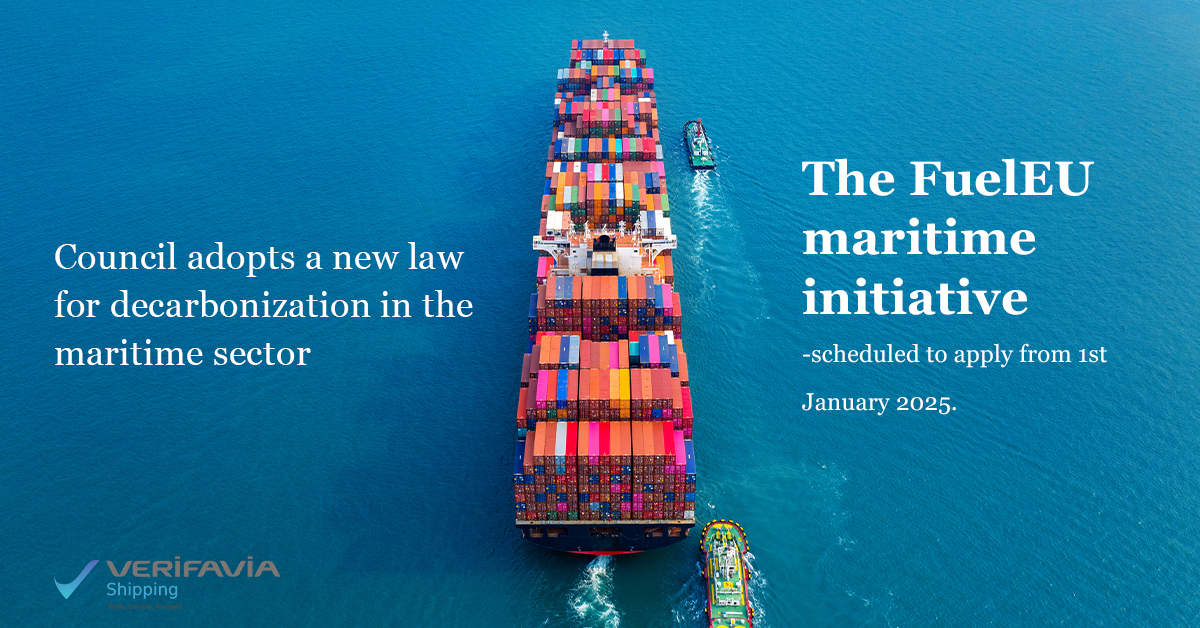Council adopts a new law for decarbonization in the maritime sector: The FuelEU maritime initiative

The new law will provide legal certainty for ship operators and fuel producers and help kick-start the large-scale production of sustainable maritime fuels, thus substantially delivering on our climate targets at European and global level.
- Raquel Sánchez Jiménez, Spanish Minister of Transport, Mobility and Urban Agenda
The objective of the new FuelEU maritime:
The primary goal of the FuelEU maritime initiative, which is a significant component of the EU's Fit for 55 package, is to promote and ensure higher demand for renewable and low-carbon fuels in the maritime sector. This initiative seeks to effectively reduce greenhouse gas emissions from shipping activities while ensuring that maritime traffic operates smoothly without creating distortions in the internal market.
This new legislation aims to align maritime transport with the EU's ambitious climate targets set for 2030 and 2050. By encouraging the widespread adoption of cleaner fuels and reducing emissions, the initiative plays a vital role in contributing to the successful implementation of the European climate law.
The new regulation under the FuelEU maritime initiative includes several key provisions aimed at achieving its objectives:
1. Gradual Decrease in Greenhouse Gas Intensity: The regulation sets measures to ensure that the greenhouse gas intensity of fuels used in the shipping sector will progressively reduce over time. This involves decreasing intensity by 2% in 2025 and achieving a substantial reduction of up to 80% by 2050.
2. Special Incentive Regime for Renewable Fuels: The regulation introduces a special incentive regime to promote the adoption of renewable fuels of non-biological origin (RFNBO) with high decarbonization potential.
3. Exclusion of Fossil Fuels from Certification Process: The certification process under the regulation will not include fossil fuels, encouraging the industry to shift towards cleaner alternatives.
4. On-Shore Power Supply Obligation for Passenger Ships and Containers: Major EU ports will be required to offer on-shore power supply for passenger ships and containers while moored at the quayside by 2030. This move aims to mitigate air pollution in ports, which are often located near densely populated areas.
5. Voluntary Pooling Mechanism: Ships can voluntarily join a pooling mechanism, where they can combine their compliance balances with one or more other ships. The pool must meet the greenhouse gas intensity limits on average, providing flexibility in achieving emission targets.
6. Time-Limited Exceptions for Specific Regions: The regulation considers time-limited exceptions for the outermost regions, small islands, and areas highly dependent on their connectivity. This recognizes their unique challenges and provides a certain level of flexibility in implementation.
7. Utilization of Revenues for Decarbonization Projects: Revenues generated from the implementation of the regulation, known as 'FuelEU penalties,' will be utilized for projects supporting the decarbonization of the maritime sector. An enhanced transparency mechanism ensures proper allocation and usage.
8. Monitoring through Commission Reporting and Review: The implementation of the regulation will be monitored through reporting and review processes conducted by the Commission, ensuring compliance and progress toward the defined goals.
WHAT’S NEXT?
After the adoption by the Council, the new regulation will undergo publication in the EU's official journal following the summer period. Subsequently, the regulation will come into effect on the twentieth day after its publication. The new rules outlined in the regulation are scheduled to apply from 1st January 2025. Back to all Industry News





